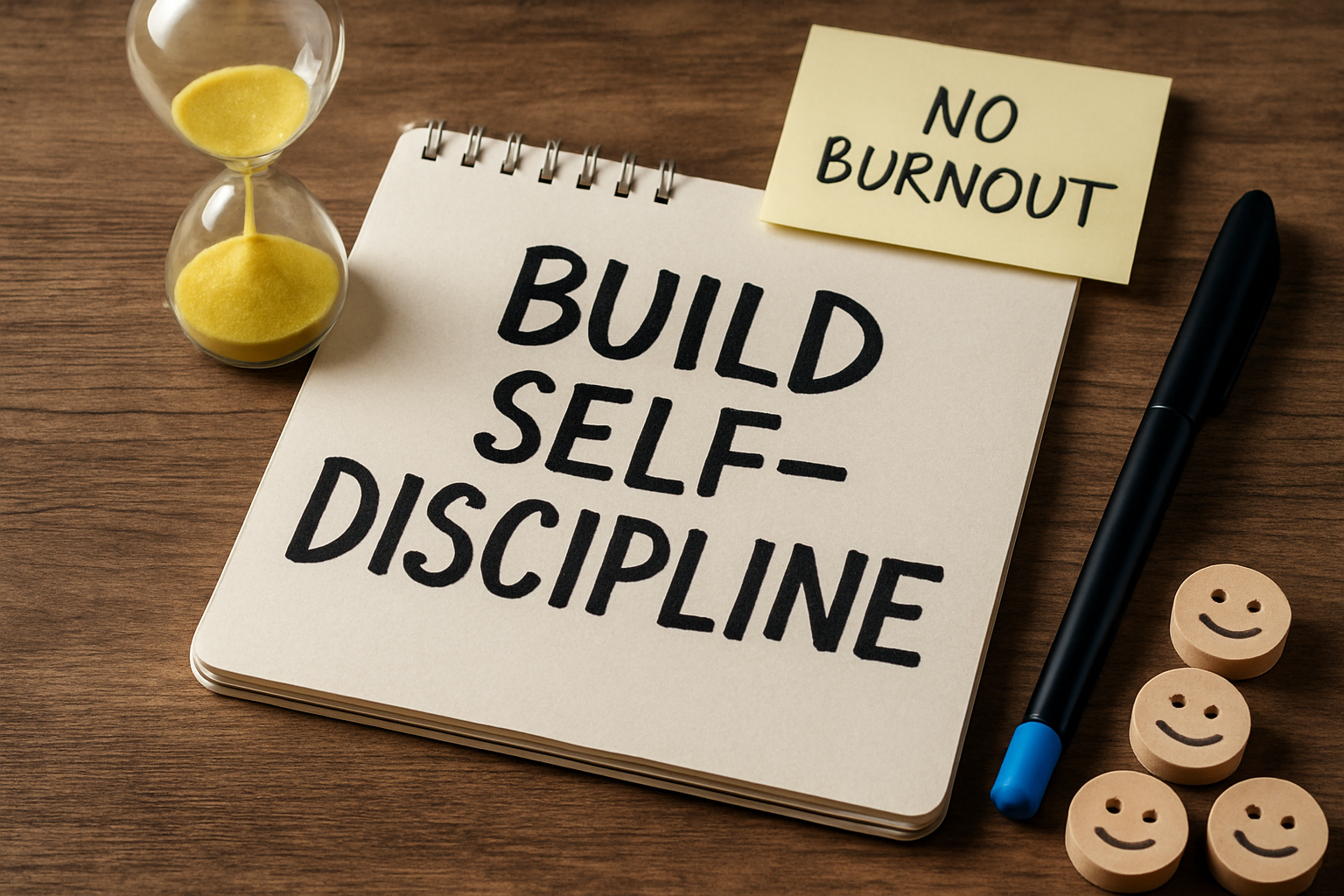Self-discipline is often seen as the secret to success—and for good reason. It helps you stay consistent, overcome distractions, and pursue your goals even when motivation fades. But here’s something people often forget: self-discipline is not about pushing yourself until you collapse. It’s about creating sustainable structure and habits that support your growth.
In this article, you’ll learn how to build real, lasting self-discipline—without burnout or guilt.
What Is Self-Discipline, Really?
Self-discipline is the ability to:
- Make decisions aligned with your long-term goals
- Resist short-term temptations or distractions
- Follow through with plans even when it’s hard
- Show up consistently, even when you don’t feel like it
It’s not about punishing yourself. It’s about choosing your future self over your current impulses.
Why Self-Discipline Often Fails
If you’ve struggled to stay disciplined in the past, it’s probably not because you’re weak or lazy.
Common reasons people fail:
- Setting unrealistic goals
- Trying to change everything at once
- Relying on motivation instead of structure
- Beating themselves up after slip-ups
- Ignoring their need for rest or joy
The solution? Discipline that is compassionate, strategic, and sustainable.
1. Start Small (Really Small)
The biggest mistake is starting too big.
Instead of: “I’ll work out every day for an hour.”
Try: “I’ll do 5 minutes of movement each morning.”
Instead of: “I’ll write a book this month.”
Try: “I’ll write 100 words a day.”
Start with habits that feel almost too easy to fail. That’s how you build momentum.
2. Create a Routine, Not a Schedule
Schedules can change. Routines give you structure without rigidity.
Build anchor habits into your day:
- Morning: Drink water, stretch, plan your priorities
- Afternoon: Walk or rest screen-free for 10 minutes
- Evening: Reflect and unplug 30 minutes before bed
Routines remove the need for constant willpower.
3. Use “If–Then” Planning
Set up responses for moments of temptation.
Examples:
- “If I feel like skipping my workout, then I’ll just do 5 minutes of stretching.”
- “If I want to scroll social media while working, then I’ll turn my phone face-down.”
- “If I break my habit, then I’ll restart tomorrow—no guilt.”
This turns reaction into preparation.
4. Track Progress Visually
Use a simple habit tracker or calendar. Every time you follow through, mark it.
Seeing the streak grow motivates your brain to keep it alive. Even a paper checklist can be powerful.
Don’t aim for perfection—aim for consistency.
5. Reward Progress, Not Perfection
Celebrate your efforts.
Examples:
- “I showed up three times this week—I’m proud of that.”
- “I stuck to my plan for 15 minutes—that counts.”
- “I didn’t feel like doing it, but I did it anyway.”
Rewards can be as simple as a moment of recognition, a small treat, or time to rest.
Self-discipline doesn’t have to be cold—it can feel encouraging and kind.
6. Remove Friction
Make the right choice easier, and the wrong one harder.
Examples:
- Lay out your gym clothes the night before
- Block distracting websites during work hours
- Prep healthy meals ahead of time
- Keep your phone in another room when focusing
Design your environment to support your goals, not fight them.
7. Accept and Learn From Slips
You will slip up. That doesn’t mean you’ve failed—it means you’re human.
When it happens:
- Avoid “all or nothing” thinking
- Reflect: What triggered the slip? How can I adjust?
- Restart the next day with compassion
Resilience is a core part of real discipline.
8. Connect Habits to Your Identity
Don’t just say, “I’m trying to exercise.”
Say, “I’m becoming the kind of person who moves every day.”
Don’t say, “I want to write more.”
Say, “I’m a writer who shows up to the page.”
Identity-based habits stick because they shape who you believe you are.
9. Build in Rest and Joy
Discipline without rest is a fast road to burnout.
Schedule:
- Days off
- Short breaks between focus sessions
- Time for hobbies and laughter
- Sleep (non-negotiable)
Discipline is not about doing more—it’s about doing what matters most, with balance.
10. Surround Yourself with Accountability
Tell someone your goal. Work alongside others. Join a group or use an app that tracks progress.
Accountability doesn’t have to be pressure—it can be support and encouragement.
Self-Discipline Is a Practice, Not a Personality Trait
You don’t need to be perfect. You don’t need to be naturally “disciplined.” You just need to start, keep showing up, and adjust as you grow.
Try this today:
- Choose one small habit that aligns with your goals
- Do it for 2 minutes
- Track it
- Celebrate that you showed up
That’s real discipline. And it’s how big change begins—one step at a time.
